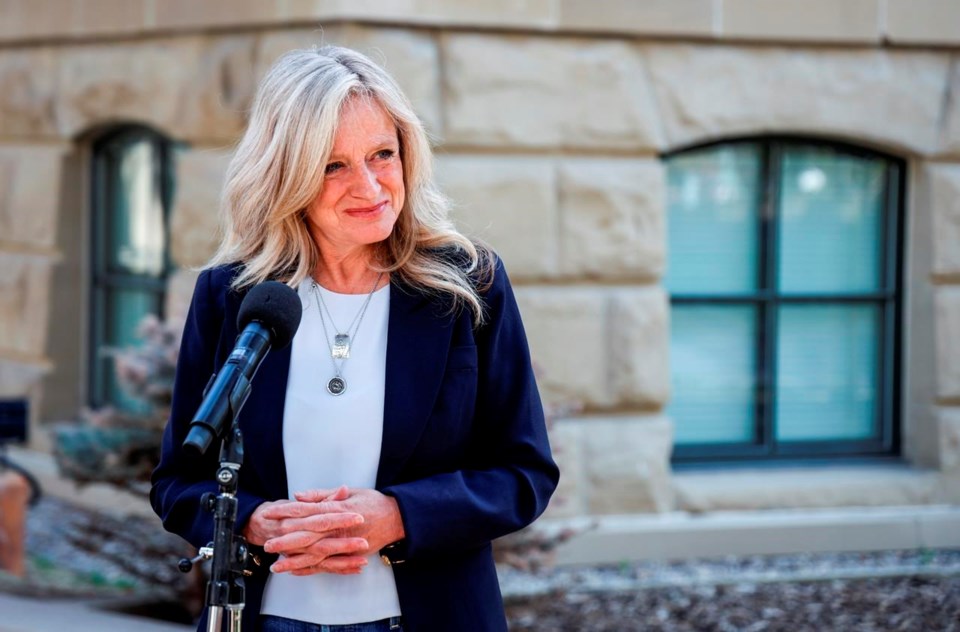EDMONTON — Alberta’s NDP says it would raise the corporate income tax rate to 11 per cent from eight as part of a broader three-year plan to keep the budget balanced while increasing spending virtually across the board.
NDP candidate Shannon Phillips outlined the plan Tuesday as the Alberta election campaign passed the halfway mark, with voting day on May 29.
Phillips, the caucus finance critic, said her party would hike spending in health care, build more schools, hire thousands more teachers, create primary health-care teams and introduce tax credits to spur investment among many other initiatives.
The NDP has also promised to cap auto insurance, freeze personal income taxes and tuition, and not introduce a sales tax.
Phillips said the plan would position Alberta to grow while still maintaining the lowest corporate tax rate in Canada.Â
She said the United Conservatives cut the corporate tax rate from 12 per cent to eight per cent to launch a job boom and reduce corporate vacancy rates in Calgary, neither of which she said have materialized.
“We understand the importance of maintaining a competitive tax rate and that is why we eliminated the small-tech business tax rate (in our platform),” said Phillips.
“When the UCP lowered the corporate tax rate to eight per cent, it amounted to nothing but a no-strings-attached handout.”
If oil and gas prices remain steady as expected in the latest budget, Phillips said the NDP predicts a $1.2-billion surplus this year,and about $1 billon in each of the two years after that.
The projections still rely heavily on those prices remaining stable, a boom-and-bust problem that has long plagued Alberta governments, including under the NDP from 2015 to 2019.Â
Collapsing oil prices led to the NDP running multibillion-dollar deficits and racking up taxpayer-supported debt, as did the UCP early in its term when oil-price woes slammed head-on into global pandemic shutdowns.
Phillips said tax credits and other initiatives to grow the economy, along with the hike in the corporate tax, would help keep Alberta’s budget above water should the non-renewable resource sector falter.
Notley’s government raised the corporate income tax rate to 12 per cent from 10 per cent during its term, while the UCP then rolled it back to eight under former premier Jason Kenney.
Both sides have pledged not to introduce a sales tax or increase personal income taxes if elected.
On the first day of the campaign, UCP Leader Danielle Smith pledged to create a new tax bracket delivering about $760 more for everyone making more than $60,000 a year at an estimated cost of about $1 billion to the treasury.
United Conservative candidate Brian Jean said the NDP’s corporate tax hike would be the centrepiece of renewed measures to punish job creators and roll the economy backward.
“That is an investment killer,” Jean said.
“A 38 per cent increase in Alberta corporate taxes does not attract businesses."
The UCP has not put out its costed platform, but Jean pointed reporters to the UCP's budgets.
The current budget, introduced in February, hiked spending virtually across the board, particularly in health and education, while accruing a projected $2.4-billion surplus.
The UCP also during its term de-indexed personal income tax rates, costing Albertans $647 million between 2020 and 2022, a University of Calgary study indicates. The party recently reindexed those rates.
Economist Trevor Tombe says he has concerns about the NDP projecting a boost of corporate incometax revenue from $1.8 billion to $2.3 billion with the move to 11 per cent.
Tombe estimates it’s about $1 billion too high because it fails to factor in the pushback effect: when corporations are taxed higher, they find ways to lower their taxable income.
“Business income for provinces is one of the more sensitive tax bases to tax rates,” said Tombe, with the University of Calgary.
“Businesses can shift where they're booking some of their financing. They can change the amount that they invest, and so when you increase business tax rates, you're going to get the corporate taxable income levels to shrink a little as a result.”
Tombe said both the NDP and UCP are relying on natural resource revenues.Â
“Roughly speaking, they're both increasing our reliance about the same amount. There’s not a lot of daylight between them at that macro level.”
 This report by The Canadian Press was first published May 16, 2023.
Dean Bennett, The Canadian Press




